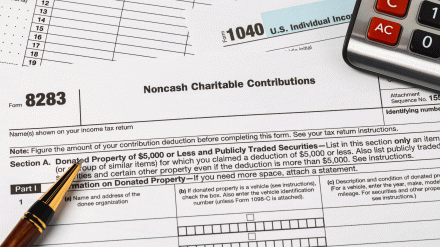There’s a right way churches should go about reimbursing lunch expenses.
In many churches, ministerial lunches are a weekly ritual. Since church matters are discussed, many church treasurers assume that the cost of the lunch can be reimbursed by the church under an accountable arrangement.
As a result, the cost of such lunches is not added to the employees’ taxable compensation for tax reporting purposes.
But is this the correct way to handle lunch expenses? If your church has an accountable reimbursement arrangement, can you reimburse lunch expenses? If so, under what circumstances? Always? Whenever church matters are discussed?
A Tax Court decision addresses this important question.
In Dugan v. Commissioner (T.C. Memo. 1998-373), a medical technician and a physician shared office space.
The two often met at lunchtime to discuss the treatment of their patients and the details of office administration and operations.
The two met at other times as well, but they found that lunchtime was often the best opportunity to meet. They alternated paying for their meals together.
On her federal income tax return, the technician deducted her share of these meal expenses (subject to the 50% reduction that applies to unreimbursed meal expenses).
The IRS disallowed any deduction for the meals on the ground that they were not a legitimate business expense. The technician appealed to the Tax Court.
Were the technician’s lunch expenses deductible?
After all, she discussed both treatment procedures and office operations during these lunches. Unfortunately, the court agreed with the IRS that the expenses were not deductible.
The court began its opinion by noting that “daily meals are an inherently personal expense, and a taxpayer bears a heavy burden in proving they are deductible” as a business expense.
Attorneys’ lunches
The court referred to a previous ruling involving attorneys.
Members of a law firm met every work day at a local restaurant to discuss work-related matters because the lawyers were all litigators and the court was not in session over the noon hour.
A federal appeals court conceded the business purpose for these lunch meetings, and that lawyers “did not dawdle over their lunch,” but it concluded that the meals represented nondeductible personal expenses rather than business expenses.
It observed:
[I]t is undeniable that eating together fosters camaraderie and makes business dealings friendlier and easier. It thus reduces the costs of transacting business, for these costs include the frictions and the failures of communication that are produced by suspicion and mutual misunderstanding, by differences in tastes and manners, and by lack of rapport. A meeting with a client or customer in an office is therefore not a perfect substitute for a lunch with him in a restaurant. But it is different when all the participants in the meal are coworkers, as essentially was the case here …. They know each other well already; they don’t need the social lubrication that a meal with an outsider provides–at least don’t need it daily. If a large firm had a monthly lunch to allow partners to get to know associates, the expense of the meal might well be necessary, and would be allowed by the Internal Revenue Service. But [the law firm in this case] never had more than eight lawyers and did not need a daily lunch to cement relationships among them ….
We may assume it was necessary for the [attorneys] to meet daily to coordinate the work of the firm, and also … that lunch was the most convenient time. But it does not follow that the expense of the lunch was a necessary business expense. The members of the firm had to eat somewhere … Although it saved time to combine lunch with work, the meal itself was not an organic part of the meeting …. Moss v. Commissioner, 758 F.2d 211 (7th Cir. 1985).
Example. The Tax Court ruled that lunch expenses incurred by a group of government attorneys who met for lunch one day each month were not business related despite the fact that business was discussed. The court did concede that “an occasional luncheon meeting with the staff to discuss the operation of the firm would be regarded as an ordinary and necessary expense,” as would “a luncheon to mark an anniversary, retirement or other occasion for an employee” since such expenses “aid in building morale and loyalty and serve as an inducement for others to work more efficiently.” Wells v. Commissioner, 36 T.C.M. 1690 (1977).
The court’s conclusion
Like the attorneys’ lunches, the lunches shared by the medical technician and the physician were not integral to the technician’s business objectives and have not been clearly linked to her production of income.
They met at lunchtime because that was the most convenient and feasible time to meet.
Their business relationship was well established and did not require “social lubrication,” at least not as often as [she and the physician] dined together.
Indeed, the frequency of their lunches together and the reciprocal nature of their meal arrangement belie the existence of any business purpose for the meals …. If taxpayers were permitted to deduct meal expenses in such circumstances then … only the unimaginative would dine at their own expense.
Why does this case matter to how church treasurers reimburse lunch expenses?
Consider the following checklist:
1. Entertainment expenses. Local lunch expenses incurred by church employees qualify as a business expense, and can be reimbursed by a church under an accountable expenses reimbursement arrangement, only if they qualify as entertainment expenses. The requirements for substantiating entertainment expenses are strict. You must demonstrate that the expenses are either (1) directly related to the active conduct of your ministry, or (2) associated with the active conduct of your ministry and the entertainment occurred directly before or after a substantial business discussion.
In order to show that entertainment was directly related to the active conduct of your business, you ordinarily must be able to demonstrate that (1) you had more than a general expectation of deriving income or some other specific business benefit at some indefinite future time; (2) you did engage in business during the entertainment period; and (3) the main purpose of the entertainment was the transaction of business.
In order to show that entertainment was associated with the active conduct of your ministry, you must be able to demonstrate that you had a clear business purpose in incurring the expense, and that the meal or entertainment directly preceded or followed a substantial business discussion.
2. Frequent staff lunches. Frequent lunches with the same members of the church staff are much less likely to qualify as a business expense, even if church business is discussed. For example, if the same three church staff members go out to lunch every Friday, it is very unlikely that any of these lunches will qualify as a business expense. After all, these persons work in the same office, and presumably have considerable interaction during the week. A shared lunch under these circumstances does not constitute an ordinary and necessary business expense.
Key point. It is worth noting that the Tax Court in the Wells case (summarized in an example in this article) met for lunch one day each month. This was considered too frequent to be business related.
3. Occasional lunches with non staff members. Such lunches are more likely to qualify as entertainment expenses, and as a result the costs of these lunches can be reimbursed by the church under an accountable expense reimbursement arrangement. To illustrate, a lunch arranged by a pastor with a local architect to discuss new building plans would qualify as a business expense.
4. Occasional employee lunches. The Tax Court, in a previous decision (the Wells case, summarized in an example in this article) addressing the deductibility of lunch expenses incurred by attorneys one day each month, conceded that “an occasional luncheon meeting with the staff to discuss the operation of the firm would be regarded as an ordinary and necessary expense,” as would “a luncheon to mark an anniversary, retirement or other occasion for an employee” since such expenses “aid in building morale and loyalty and serve as an inducement for others to work more efficiently.”
5. Lunch expenses while traveling. This article only addresses the reimbursement of local lunch expenses. Lunch expenses incurred while church employees are away from town on business travel are business related and can be reimbursed under an accountable arrangement.
6. Other requirements of an accountable arrangement. In order for your church to reimburse expenses under an accountable expense reimbursement arrangement, you must have adopted a reimbursement arrangement that meets the following three requirements: (1) Only business expenses are reimbursed (expenses that would qualify for a business expense deduction on a taxpayer’s personal income tax return). (2) The church only reimburses an expense if the employee substantiates, with written records (including a receipt for expenses of $75 or more), the amount, date, location, and business connection of the expense. In addition, in the case of entertainment expenses (such as local lunch expenses) the employee must document the “occupation or other information relating to the person or persons entertained, including name, title, or other designation, sufficient to establish business relationship to the taxpayer.” (3) Employees must return to the church any reimbursements in excess of substantiated expenses. This article addresses only on the first of these three requirements. Even if a particular lunch qualifies as a business expense, the church may reimburse it under an accountable arrangement only if the other two requirements for an accountable arrangement are met.
If any of these three requirements is not satisfied, the church’s reimbursement of a lunch expense is nonaccountable, and the full amount of the reimbursement must be allocated to the employees’ W-2s.
7. Unreimbursed expenses. This article addresses the tax consequences of a church’s reimbursement of employee lunch expenses. In some cases, church employees pay for their own lunch expenses. Such “unreimbursed” expenses may be deducted as an employee business expense, but only if reimbursement from the church was not available. Further, church employees may deduct only 50% of business related entertainment expenses, including meals. This 50% limitation is incorporated directly into the tax returns (line 9 of Form 2106, and line 24c of Schedule C). Note however that the 50% limitation does not apply to expenses that are reimbursed by an employer under an accountable reimbursement plan. IRS Publication 463 states: “As an employee, you are not subject to the 50% limit if your employer reimburses you under an accountable plan and does not treat your reimbursement as wages.” Publication 463 states that the self employed persons also can avoid the 50% limitation through use of an accountable reimbursement arrangement.
Here are some examples that will illustrate the issues addressed in this article.
Example 1: A church has 3 pastors who for many years have gone out to lunch every Friday. Church business is almost always discussed at these lunches. The cost of these lunches is always charged to a church credit card, and the church treasurer has never reported the church’s reimbursements as taxable income to the pastors by including it on their W-2 forms. This is incorrect. According to the rulings summarized in this article, these lunches do not qualify as business expenses, and as a result they should not be charged to the church credit card. If the pastors continue to charge the lunches to the church credit card, the treasurer will need to allocate the reimbursed expenses to the pastors and report the reimbursements as taxable income on the pastors’ W-2 forms at the end of the year. The treasurer need not withhold additional income taxes because the pastors’ wages are exempt from income tax withholding.
Example 2: Same facts as the previous example, except that nonminister church employees rather than pastors are involved. The answer is the same, except that the church will need to withhold income taxes and FICA taxes from the value of the lunches.
Example 3: A pastor occasionally meets church members for lunch, and charges the cost of these lunches to the church credit card. The purpose of these lunches is for the pastor to become better acquainted with members, and to provide spiritual guidance as needed. These expenses qualify as an entertainment expense. As a result, the expenses reimbursed by the church are accountable so long as the requirements for an accountable reimbursement (summarized in this article) are satisfied.
Example 4: Same facts as the previous example, except that the pastor informs the church treasurer each month of the approximate amount he spent during the previous month on such lunches, and receives a reimbursement check. This arrangement is nonaccountable since the substantiation requirements for an accountable arrangement are not met. As a result, the treasurer will need to add the value of all lunch expense reimbursements to the pastor’s W-2 at the end of the year.
Example 5: A pastor takes the church staff out to lunch twice each year as a means of expressing appreciation for their hard work. The cost of these lunches is charged to the church credit card. These expenses represent a legitimate business expense, and as a result they can be reimbursed by the church under an accountable arrangement so long as they are adequately substantiated. As a result, the church treasurer would not report any of the reimbursements as taxable income. The Tax Court has noted that “an occasional luncheon meeting with the staff to discuss the operation of the firm would be regarded as an ordinary and necessary expense,” as would “a luncheon to mark an anniversary, retirement or other occasion for an employee” since such expenses “aid in building morale and loyalty and serve as an inducement for others to work more efficiently.” Wells v. Commissioner, 36 T.C.M. 1690 (1977).
Example 6: A church’s two pastors go out to lunch once each month. Church business is always discussed, and the cost of the lunches is charged to the church credit card. A federal appeals court has observed that monthly lunches by law firm members “might well be necessary, and would be allowed by the Internal Revenue Service.” Moss v. Commissioner, 758 F.2d 211 (7th Cir. 1985). On the other hand, the Tax Court has ruled that monthly lunch expenses incurred by government attorneys were not business related despite the fact that business was discussed. Wells v. Commissioner, 36 T.C.M. 1690 (1977). In summary, while there is legal support for treating monthly lunch expenses as business-related, but there is also support for the opposite conclusion. This suggests that the business nature of monthly lunch expenses may be challenged by the IRS, but that no penalties would be assessed.


















